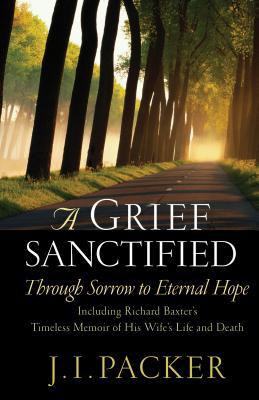A Grief Sanctified: Through Sorrow To Eternal Hope
by Richard Baxter
Their love story is not one of fairy tales. It is one of faithfulness from the beginning through to its tragic ending.
Richard and Margaret Baxter had been married only nineteen years before she died at age forty-five. A prominent pastor and prolific author, Baxter sought consolation and relief the only true way he knew- in Scripture with his discipline of writing. Within days he produced a lover's tribute to his mate and a pastor's celebration of God's grace. It is spiritual storytelling at its best, made all the more poignant by the author's unveiling of his grief.
J. I. Packer has added his own astute reflections along with his edited version of this exquisite memoir that considers six of life's realities-love, faith, death, grief, hope, and patience. He guides you in comparing and contrasting the world's and the Bible's ideals on coping with these tides of life. The powerful combination of Packer's insights and Baxter's grief gives you a beacon if you are searching for God, a pathfinder for your relationships, and a lifeline if you are grieving.
Richard and Margaret Baxter had been married only nineteen years before she died at age forty-five. A prominent pastor and prolific author, Baxter sought consolation and relief the only true way he knew- in Scripture with his discipline of writing. Within days he produced a lover's tribute to his mate and a pastor's celebration of God's grace. It is spiritual storytelling at its best, made all the more poignant by the author's unveiling of his grief.
J. I. Packer has added his own astute reflections along with his edited version of this exquisite memoir that considers six of life's realities-love, faith, death, grief, hope, and patience. He guides you in comparing and contrasting the world's and the Bible's ideals on coping with these tides of life. The powerful combination of Packer's insights and Baxter's grief gives you a beacon if you are searching for God, a pathfinder for your relationships, and a lifeline if you are grieving.
BUY NOW
Paperback, 191 pages
Published September 1st 2002 by Crossway Books (first published 1998)
© 2025 Bibleportal.com 版权所有.

He wrote 168 or so separate works -- such treatises as the Christian Directory, the Methodus Theologiae Christianae, and the Catholic Theology, might each have represented the life's work of an ordinary man. His Breviate of the Life of Mrs Margaret Baxter records the virtues of his wife, and reveals Baxter's tenderness of nature. Without doubt, however, his most famous and enduring contribution to Christian literature was a devotional work published in 1658 under the title Call to the Unconverted to Turn and Live. This slim volume was credited with the conversion of thousands and formed one of the core extra-biblical texts of evangelicalism until at least the middle of the nineteenth century.
Richard Baxter was ordained into the Church of England, 1638, but in two years allied with Puritans opposed to the episcopacy of his church. At Kidderminster (1641-60) he made the church a model parish. The church was enlarged to hold the crowds. Pastoral counseling was as important as preaching, and his program for his parish was a pattern for many other ministers. Baxter played an ameliorative role during the English Civil Wars.
He was a chaplain in the parliamentary army but then helped to restore the king (1660). After the establishment of the monarchy, he fought for toleration of moderate dissent in the Church of England. Persecuted for more than 20 years and was imprisoned (1685) for 18 months, the Revolution of 1688, replacing James II with William and Mary, brought about an Act of Toleration that freed Baxter to express his opinions.
... Show more